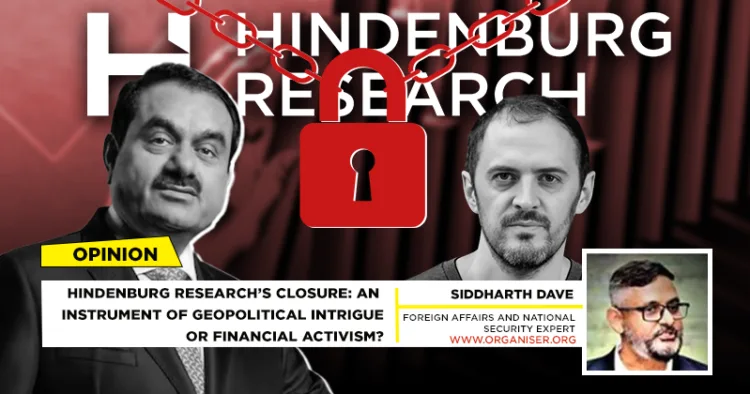The announcement by Nate Anderson, founder of Hindenburg Research, regarding the firm’s closure has sparked widespread speculation and analysis. Infamous for its incisive and high-stakes short-selling reports, Hindenburg’s dissolution signifies both the conclusion of a disruptive chapter in financial markets and the initiation of discussions surrounding its legacy and broader implications. The firm’s work, marked by its exposure of financial malpractices and its impact on global corporations such as India’s Adani Group, has raised profound questions about its motivations and the interplay between finance, politics, and geopolitics.
The Adani Controversy: A Strategic Strike or Transparency?
In January 2023, Hindenburg released a scathing report on the Adani Group, alleging systemic financial fraud and stock manipulation. The timing of the report—just before Adani Enterprises’ Rs 20,000 crore follow-on public offering (FPO)—had catastrophic effects, eroding billions in market capitalization and damaging investor confidence. Beyond financial repercussions, the report stirred political debates, raising questions about the intersection of global finance and national sovereignty.
The report’s release was indeed a deliberate attempt to destabilize India’s economic stability. With the Adani Group perceived as closely aligned with the governing administration, the controversy was interpreted as a proxy attack on the leadership’s credibility and India’s international standing. Opposition parties seized on the issue, using it to amplify criticisms of Modi’s economic policies and corporate affiliations.
Allegations of Deep State Machinations
The Bharatiya Janata Party (BJP) strongly denounced Hindenburg Research, exposing it as a pawn in the hands of Western powers seeking to thwart Bharat’s rise as a global power. The BJP highlighted the firm’s alignment with the “woke ecosystem” and collusion with domestic opposition forces, including the Congress party, in an orchestrated campaign to destabilize India’s economic and political trajectory. This narrative pointed to a calculated attempt to undermine Bharat’s sovereignty by targeting key industrial players who symbolize the nation’s economic progress.
The timing of Hindenburg’s report, coupled with its alignment with Western skepticism toward emerging powers like Bharat, was no coincidence. The BJP attributed the narrative-driven economic anxieties amplified by the Adani controversy as a deliberate ploy to influence public sentiment ahead of the 2024 Lok Sabha elections. Despite the BJP’s enduring focus on national development and governance, the incident revealed how external forces weaponize financial narratives to sow distrust and disrupt India’s upward trajectory.
This episode serves as a stark reminder of the lengths to which vested interests can go to impede Bharat’s progress. It underscores the need for unwavering vigilance, strengthened national resolve, and robust public awareness to counter these orchestrated attempts to weaken the nation’s standing on the global stage.
Hindenburg’s Track Record: Transparency or Opportunism?
Hindenburg Research built its reputation on targeting high-profile companies, exposing issues such as fraudulent claims, regulatory lapses, and operational malpractices. Notable cases included Nikola Corporation in 2020, Clover Health in 2021, and Block, Inc. in 2023, among others. Each report triggered substantial market reactions, often leading to significant financial fallout for the targeted entities. While the firm positioned itself as a champion of financial accountability, critics have highlighted the opportunistic nature of its operations, raising questions about the ethics of short-selling and the timing of its reports.
The Fallout: Financial Weaponization and Neo-Colonial Dynamics
The BJP’s allegations resonate with broader concerns about the weaponization of financial instruments against emerging economies. India, as an ascending power, has faced intensified scrutiny under the guise of financial transparency. However, such scrutiny often aligns with geopolitical agendas aimed at containing the rise of non-Western powers. The cascading effects of Hindenburg’s allegations on Adani, including diminished investor confidence and intensified opposition rhetoric, illustrate the vulnerability of emerging markets to external interventions. This underscores the urgency for robust regulatory frameworks and heightened public awareness to mitigate such risks.
Hindenburg’s Exit: Calculated Closure or Tactical Retreat?
Nate Anderson’s framing of the firm’s closure as “the adventure of a lifetime” has not dispelled doubts about its timing and intent. It is speculated that the closure mirrors the precision of its operations, suggesting a strategic retreat designed to evade scrutiny or consequences. The decision invites further debate on the firm’s motivations and its role within a global financial ecosystem increasingly intertwined with political agendas.
Broader Implications and Lessons for India
Hindenburg Research’s legacy highlights the complex interplay between financial activism and geopolitical maneuvering. While the firm’s work spotlighted corporate malpractices, it also revealed how global financial systems can be wielded as tools for political influence. For India, this episode serves as a critical reminder of the need to safeguard its economic trajectory against external manipulation.
India must draw important lessons from this episode, including the urgent need to strengthen regulatory mechanisms to prevent financial destabilization, enhance public awareness about the convergence of financial narratives and political agendas, and adopt proactive global engagement to counter misrepresentations and bolster its image internationally.
The closure of Hindenburg Research may mark the end of an era, but its implications will linger for years to come. The key question remains: Was Hindenburg a genuine advocate for financial accountability, or an instrument of geopolitical intrigue? For India, the answers carry critical lessons in navigating a globalized yet deeply politicized financial landscape. As the nation continues its ascent, it must remain vigilant against forces seeking to disrupt its progress, ensuring that its growth story is fortified by resilience and integrity.




















Comments